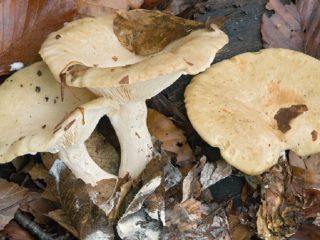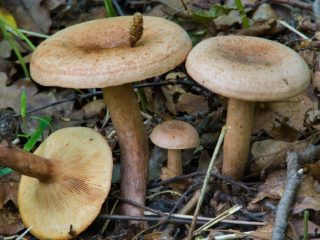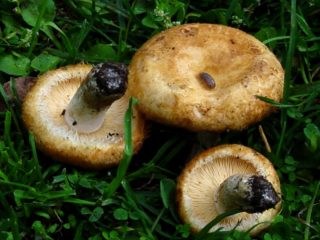Content
Gladysh mushroom is one of the representatives of the numerous russula family. Its other common name is ordinary milkman. Grows singly and in groups. A distinctive feature of the species, like all its close relatives, is that when cut, milky juice is released from the pulp. In the official guides, it can be found under the name Lactarius trivialis.
Where does the common lactarius grow
Gladysh is a purely forest mushroom. It grows in coniferous and deciduous forests, as well as in mixed plantings. This species is found in sandy loam and clay soils rich in limestone. The smoothie needs high humidity, so it can often be found near swamps and in moss.
Gladysh is distributed throughout Eurasia in the northern regions, where conditions are more favorable for its growth.
What does a smooth mushroom look like?
According to the photo and description, Gladysh is a large mushroom with a classic shape of the fruiting body. The diameter of its upper part can reach 7-15 cm. In young specimens, the cap is hemispherical, and its edges are tucked down. It is convex in the center. As it matures, the upper part of the mushroom opens up and takes on a funnel-shaped shape. With little physical impact, it easily breaks, crumbles.
The color of the hat includes a gray, lead and lilac shade. In young mushrooms, the cap is most often light lilac, and then it becomes pink-brown or yellowish-lilac. The surface is smooth, but becomes slippery with high humidity.
The pulp is fleshy, dense, yellowish, when it breaks, milky juice appears, which is white in the smooth, but when exposed to air it turns a little green.
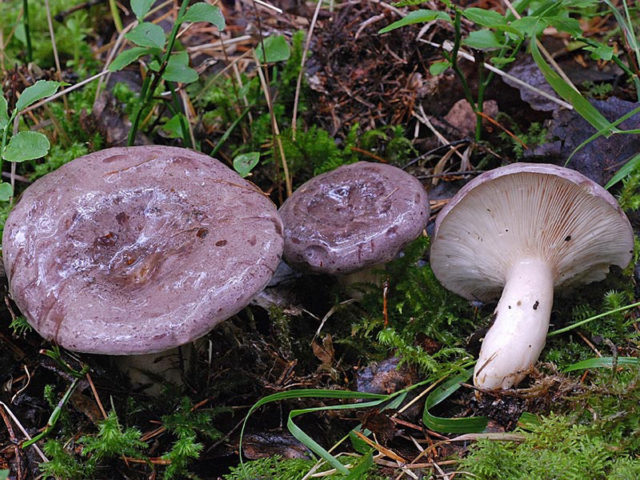
The mushroom smell is practically not caught in the smoothie
On the back of the cap there are frequent descending plates of a light cream shade. In ripe smoothies, yellowish stains or spots from flowing milky juice may appear on them. Spores are rounded, prickly, colorless. Their size is 8-11 x 7-9 microns. Spore powder of cream shade.
The stem of the smoothie is cylindrical, its length can reach from 5 to 15 cm, depending on the growing conditions. The thickness varies from 1 to 3 cm. It is identical in color to the cap, but lighter in tone. At a young age, the fungus forms a small cavity inside the stem, which only grows as it grows.
Edible or not smooth mushroom
According to official data, the common milkman is classified as an edible species. But due to its peculiarity to secrete milky juice, it requires preliminary preparation before cooking.In terms of taste, it belongs to the second category.
Gladysh mushroom is considered the best for salting, since during the cooking process it loses its bitterness and acquires a pleasant elasticity.
False doubles of the common smoothie
As you can see in the photo, it is difficult to confuse the common lactarius with other species due to the peculiar color of the fruit body. But not all novice mushroom pickers are able to accurately distinguish smoothies from doubles. Therefore, you should study similar species and their features.
Faded milky
This is a close relative of the common smoothfish and also belongs to the russula family. The upper part is gray-brown or wine-brown in color. Moreover, its center is much darker. The stem is slightly lighter, tapering at the base. The size of the fruiting body is smaller than that of the smooth. The diameter of the cap is 4-10 cm, and the length of the leg is 4-8 cm. When the pulp is broken, milky juice oozes abundantly. It is white in color, but takes on an olive tint on contact with air. The mushroom is considered conditionally edible and requires preliminary soaking. The official name is Lactarius vietus.
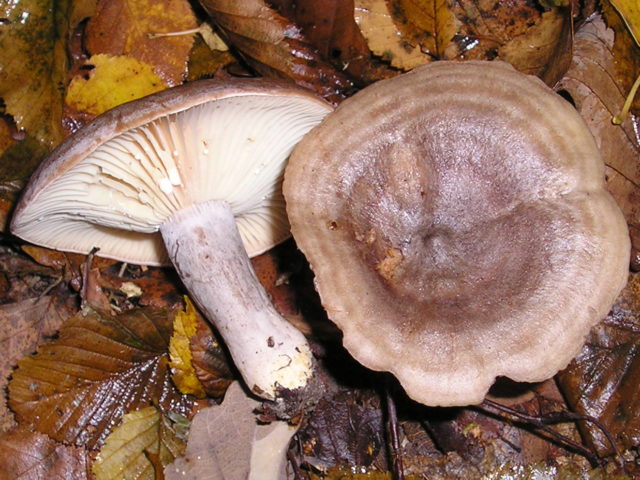
The flesh tastes of a faded milky-hot spicy
Serushka
This species also belongs to the russula family and is considered conditionally edible. You can often hear other names for the mushroom: gray nest, seryanka, pathik, podoshnitsa, plantain. The diameter of the upper part reaches from 5 to 10 cm. Its shape is initially convex, and then becomes funnel-shaped, but a slight elevation remains in the center. The edges are uneven, wavy. The surface has a grayish-lead tint, the mucus is an order of magnitude less than that of the smooth. On the back of the cap, you can see rare wide plates, often winding. The leg is cylindrical, to match the upper part. Its structure is loose. The official name is Lactarius flexuosus.
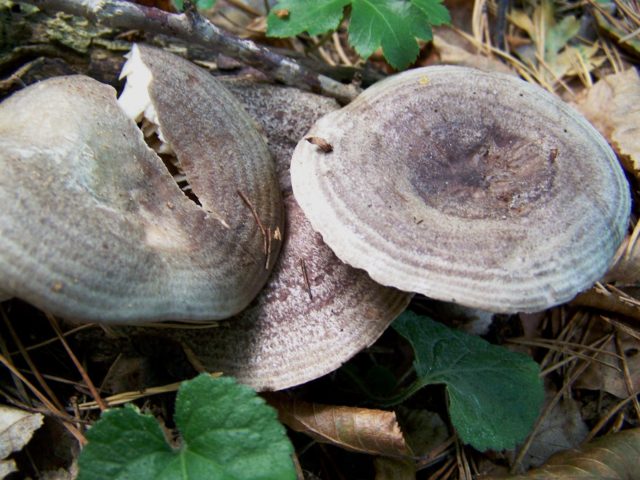
When cracked, the flesh of the grill emits a light fruity aroma
Milk gray-pink
Another representative of the russula family. In foreign sources it is listed as a weakly poisonous mushroom, in Russian it is conditionally edible, but of little value. The fruit body is large. The size of the cap reaches 8-15 cm in diameter. It is characterized by an irregularly rounded shape. Initially hemispherical, and later it becomes similar to a funnel, but some specimens retain an elevation in the center. The color is dull, including pink, gray, brown and brown. The surface is velvety, it remains dry even at high humidity. When broken, the pulp exudes a strong spicy odor, the taste is sharp-burning. The leg is thick, 5-8 cm high. The official name is Lactarius helvus.
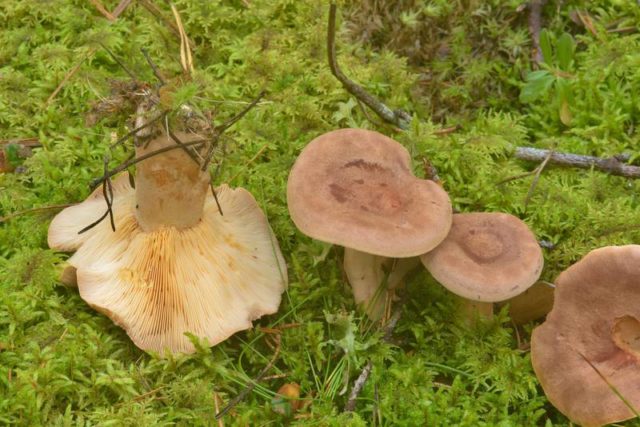
The milky juice in the gray-pink mushroom is transparent and scarce, in overripe species it may be completely absent
Rules for collecting common lactarius mushrooms
The fruiting period of the smoothfish falls on the second half of July and lasts until the beginning of September. At this time, you need to go into the forest in search of him, taking with you a sharp knife and a basket.
Smooth mushrooms for pickling need to be collected small, since young specimens have a denser pulp. Cut them off at the base, leaving a small stump in the soil. This method ensures that the mycelium remains intact and can bear fruit the next year. Before putting the mushroom in the basket, it must be thoroughly cleaned of soil and fallen leaves.
How to cook gladysh mushroom
Mushroom common for salting should be used only after primary processing. This is necessary to neutralize the acrid taste of the pulp.
Initially, the milkmen must be cleared of residues of forest litter and earth. If necessary, remove all damaged areas and wash thoroughly.After that, the smooth mushroom must be soaked in water for 24 hours, and the liquid must be changed at least five times during this period.
At the end of this procedure, you can proceed to further cooking.
Glazed mushroom recipes
The method of salting the common lactarius can be hot and cold. But any processing must be carried out after preliminary soaking.
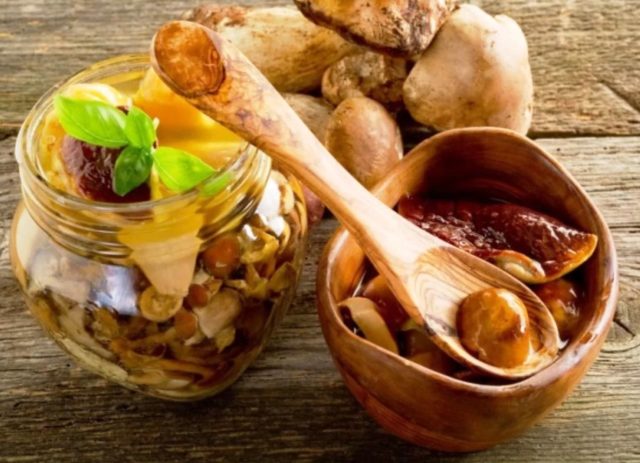
Smoothies are great for pickling, but that doesn't mean they can't be pickled.
Hot salting
To salt 2 kg of smoothies in a hot way, you will need:
- vegetable oil - 150 ml;
- salt - 50 g;
- water - 1 l;
- garlic - 1 large head;
- bay leaf - 2-3 pcs.;
- currant leaves, dill - optional;
- allspice - 5 pcs.
Procedure:
- Boil water, salt, pour mushrooms into it.
- Add spices, and then simmer for 50 minutes.
- Drain the liquid into a container.
- Put milkers, garlic, spices in steamed jars.
- Pour salt into the marinade, add oil, mix well.
- Pour the resulting liquid to the top of the mushrooms.
- Put garlic on top, roll up.
After cooling down, move the jars to the basement.
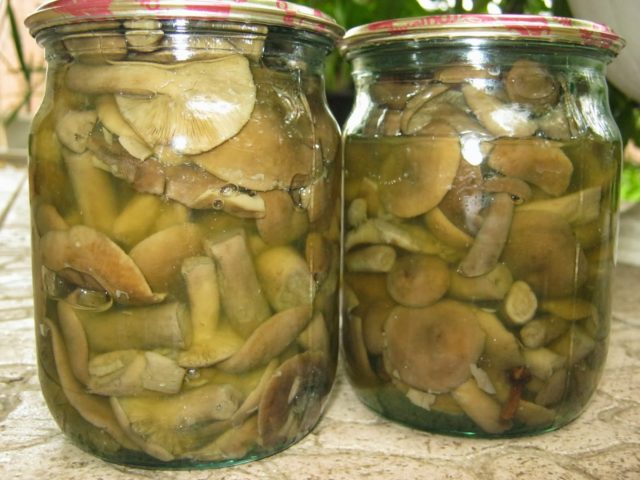
It is possible to store milkmen prepared in this way for one season.
The usual salting method
For salting mushrooms (2 kg) in the classical way, you will need:
- salt - 70 g;
- cloves - 6 pcs.;
- bay leaf - 3 pcs.;
- allspice - 8 peas;
- garlic - 6 cloves.
Procedure:
- Pour salt evenly onto the bottom of a wide enamelled container.
- Place the mushrooms on top, top down.
- Sprinkle chopped garlic and spices on them.
- Then repeat from the first step until all the mushrooms are stacked in layers.
- Sprinkle with salt on top.
- Cover with multi-layer gauze, place the load.
- Put the saucepan with mushrooms in a cool place.
With this method of preparation, the common lacquer can be consumed in a month. And after two days, the mushrooms should be completely immersed in the liquid.
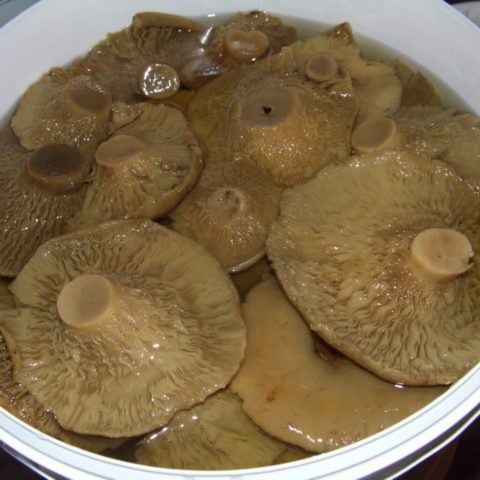
During the entire waiting period, the gauze should be rinsed periodically
Pickled smoothies
To marinate 2 kg of smooth mushrooms, you will need:
- water - 1.5 l;
- salt - 70 g;
- vinegar - 100 ml;
- sugar - 20 g;
- allspice - 5 peas;
- bay leaf - 2 pcs.
Cooking procedure:
- Boil water (1 L) adding 20 g of salt.
- Pour in the milkmen, boil for 40 minutes.
- After finishing, rinse with cold water.
- Pour 0.5 liters of water into a separate container, add the rest of the components, boil.
- Pour mushrooms into the marinade, boil for 15 minutes.
- Arrange the milkmen in sterilized jars, pour to the top.
- Sterilize for 20 minutes, roll up.
After cooling, transfer the pickled smoothies to the basement.
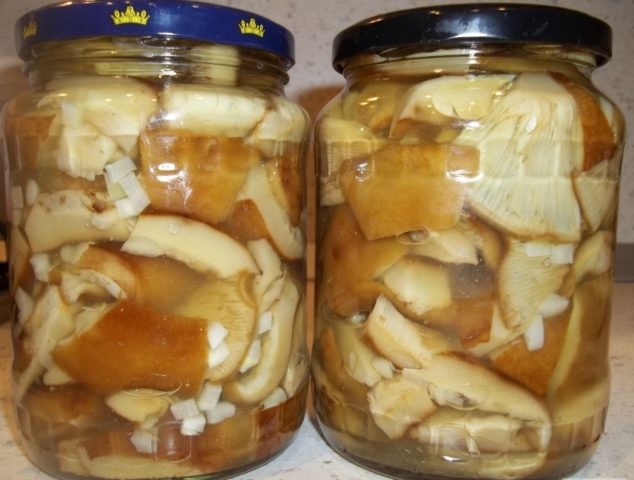
Pickled smoothies are no less tasty than salted ones
Conclusion
The smooth mushroom, when properly prepared, is able to compete with more valuable species. Therefore, many lovers of quiet hunting collect it with pleasure. In addition, this species often grows in large groups, and with luck, the basket can be filled in a matter of minutes.



